Dear colleagues,
In today's newsletter, we will announce our Christmas Photo Competition and officially wave goodbye to one of our members. We will announce our next webinar on the topic “Persulfidess”. We will also share with you a summary of October’s mental health webinar and November’s hypoxia and mitochondrial dynamics webinar, in case some of you didn’t have the chance to join. We will present to you our first edition of the PhD student mini-symposium and announce the call for travel awards for the SFRR-E Istanbul Meeting 2024. At the end of the newsletter, as always, you can also find a collection of upcoming events with important deadlines and some suggestions of interesting redox reads recently published.
First of all, we would like to say thanks to everybody who applied to become a new member of the ECR subcommittee. We will get back to you with the results of the call in time for our next month meeting.
Besides, we are super excited to present to you our new Christmas Photo Competition, in line with the cozy season. Photos need to be both science-related and within the Christmas mood! They can be taken with any device (microscope, camera, smartphone…). We will value originality and fun!
If you want to participate you can tag us on the photo in any of our social media channels (Instagram, Twitter, LinkedIn) or if you prefer something more traditional, you can send us your photos to our email account:
We are looking forward to your best photos!
Sadly, in October, we waved goodbye to one of our most charismatic members, Carlos Henríquez-Olguín. We would like to use the occasion to publicly say a big thank you to Carlos for all his great contributions to the ECR subcommittee from its foundation until now. Your dedication to the goals of the subcommittee, your determination and passion, and your beautifully designed stickers for the ECR networking events will always inspire us. We wish you the best of luck for what it is to come in your career. We will miss you!
Webinar series “Emerging leaders in redox biology”
We are happy to present to all of you the next round of our webinar series. Our next webinar will be on 5th December 2023 at 15:00 CET on the topic “Persulfides” and, we are excited to announce the following talks: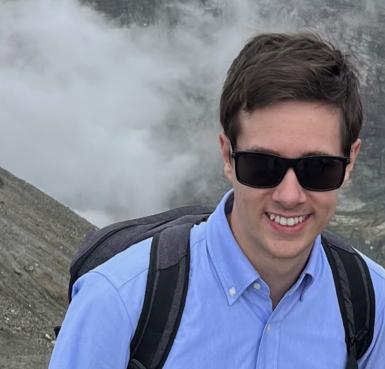 Supersulfides as a basis of antioxidant system
Supersulfides as a basis of antioxidant system
Vladimir Baraev, PhD
Department of Environmental Medicine and Molecular Toxicology, Tohoku University Graduate School of Medicine, Sendai, Japan
Uladzimir (Vladi) was born in Minsk (Belarus) where he received initial training in free radical chemistry. He then finished Master's course in molecular spectroscopy in Lille (France) and Leipzig (Germany). After he completed his Master's thesis with Maria Fedorova, Vladi joined the lab of Tobias Dick in Heidelberg, Germany to study the role of supersulfides in cellular free radical reactions and ferroptosis. After completing his Ph.D. thesis last year, Vladi moved to the lab of Takaaki Akaike in Sendai (Japan), a world leader in the supersulfide field. Now Vladi is studying the role of supersulfides in a human antioxidant defence system.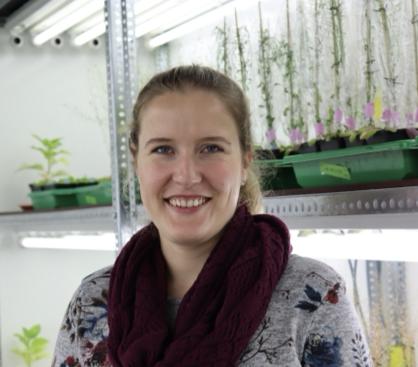 Sulfurtransferase-mediated persulfidation in plants
Sulfurtransferase-mediated persulfidation in plants
Anna Moseler, PhD
Department Chemical Signalling, Institute of Crop Science and Resource Conservation University of Bonn, Germany
She started her scientific career working on functional analysis of oxidoreductases of the glutaredoxin protein family in the model plant Arabidopsis thaliana at the University of Bonn with Andreas J. Meyer. After defending her PhD thesis, she was awarded with a prestigious Humboldt fellowship to work with Nicolas Rouhier and Jeremy Couturier in Nancy, France investigating cysteine catabolism with a focus on sulfurtransferases.
Currently, she holds a position at the Institute of Crop Sciences and Resource Conservation at the University of Bonn, Germany. Her research aim is to elucidate the molecular processes underlying persulfidation as a key posttranslational modification, where a cysteine thiol (- SH) is covalently bound to sulfur to form a persulfide (SSH). Despite the increasingly recognized role of persulfidation in plants and other species, the cellular mechanisms behind persulfide formation remain largely unknown. The goal is to identify proteins that contribute to persulfidation either directly by transferring the persulfide to specific target thiols or indirectly through the production of H2S for downstream persulfidation reactions, and to investigate the regulation and functions of the persulfides.
How can I join the webinar?
https://us06web.zoom.us/j/86469731540?pwd=Mu9W9zBMm65TpJb6k4pwviFjseHQxw.OgbiZAvSiHJI7kVt
Passcode: 433382
As many might know, the 10th of October was the World Mental Health Day, and to commemorate this important date we organised a webinar with a fantastic speaker.
From Lab to Self-Care: A Guide to Mental Wellbeing for Young Scientists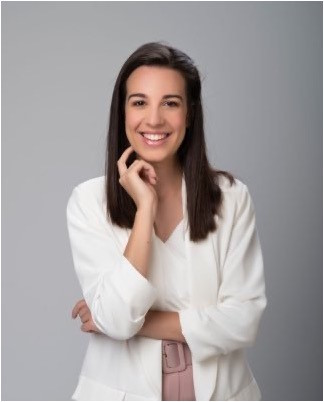 Beatriz Atienza Carbonell, MD & PhD student
Beatriz Atienza Carbonell, MD & PhD student
University of Valencia & Valencia International University, Spain
Beatriz gave an excellent presentation with data about mental health in academia and tips for identifying signs of stress and burnout. Very interestingly, she shared with us strategies for promoting mental health wellbeing:Work-life balance, boundaries for working hours/breaks
- Time management and prioritizing
- Mentorship and peer support
- Recognition and rewards
- Stress and management techniques
- Access to counseling services
She also gave us some actionable takeaways: prioritize selfcare, build support networks and stay informed.
Remember: your mental health wellbeing is as crucial as your work performance!
During this webinar we experienced some technical problems for which we would like to apologize. We have been working hard to make sure that these issues won’t happen again next time and to provide a safe environment for everybody. Thank you for your patience and understanding.
On October’s webinar we enjoyed two inspiring talks on the topic “hypoxia and mitochondrial dynamics”: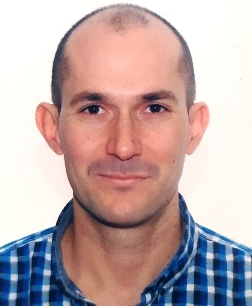 Control of bioenergetics and ROS from mitochondrial cristae Rubén Quintana-Cabrera, PhD Department of Molecular, Cellular and Developmental Neurobiology, Cajal Institute, CSIC, Madrid, Spain
Control of bioenergetics and ROS from mitochondrial cristae Rubén Quintana-Cabrera, PhD Department of Molecular, Cellular and Developmental Neurobiology, Cajal Institute, CSIC, Madrid, Spain
Dr. Quintana-Cabrera presented data on the molecular determinants of mitochondrial physio(patho)logy in the nervous system. In particular, he delved into mitochondrial bioenergetics, redox dynamics and metabolism in integrative responses, focusing on the control of bioenergetics and reactive species from the mitochondrial cristae.
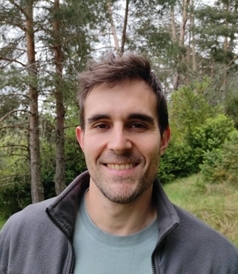 Na+ controls hypoxic redox signalling through the oxidative phosphorylation system Pablo Hernansanz Agustín, PhD Centro Nacional de Investigaciones Cardiovasculares Carlos III (CNIC), Madrid, Spain Dr. Hernansanz Agustín presented data on how Na+ acts as a second messenger regulating OXPHOS function and the production of reactive species by modulating the fluidity of the inner mitochondrial membrane (IMM). He also argued that Na+ controls hypoxic redox signalling through an unexpected interaction with phospholipids, with profound consequences for cellular metabolism.
Na+ controls hypoxic redox signalling through the oxidative phosphorylation system Pablo Hernansanz Agustín, PhD Centro Nacional de Investigaciones Cardiovasculares Carlos III (CNIC), Madrid, Spain Dr. Hernansanz Agustín presented data on how Na+ acts as a second messenger regulating OXPHOS function and the production of reactive species by modulating the fluidity of the inner mitochondrial membrane (IMM). He also argued that Na+ controls hypoxic redox signalling through an unexpected interaction with phospholipids, with profound consequences for cellular metabolism.
PhD student mini-symposium The 17th October 2023 we had our first PhD student mini-symposium entitled “Redox Relay Race: Ph.D. Students on the Move”. The format consisted in flask-talks of 5 minutes for presentation and 2 minutes for Q&A. Six promising PhD students made an excellent work presenting their research to our redox community:
- Silvana Javiera Soto Rodríguez, University of Valencia, Spain
- Julia Malo Pueyo, Vrije Universiteit Brussel, Belgium
- Şeyma Çimen, Istanbul Medipol University, Turkey
- Panagiotis Chatzinikolaou, Aristotle University of Thessaloniki, Greece
- Vera Skafar, University of Würzburg, Germany
- Kristine Stromsnes, University of Valencia, Spain
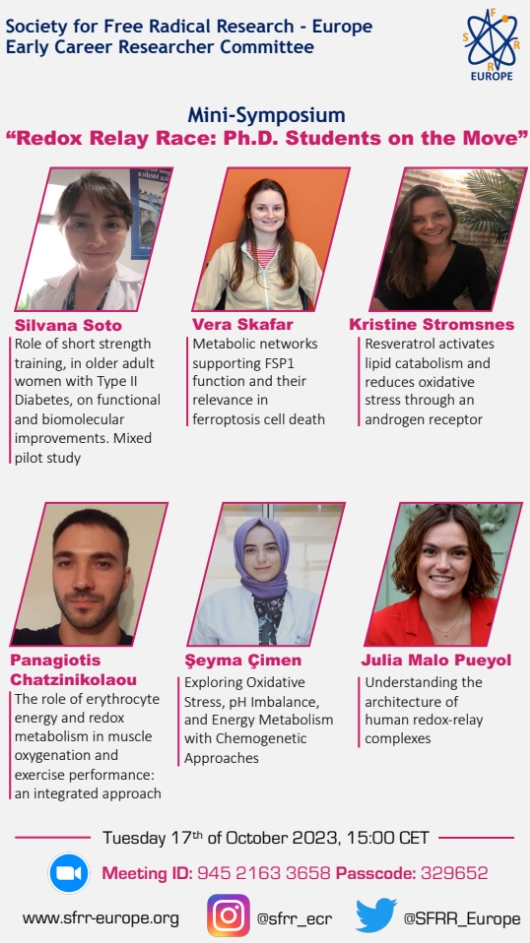
We would like to thank all the speakers again for their disponibility and for the interesting work they presented. If you are a PhD student or you know a PhD student who might be interested in participating, be prepared for our next mini-symposium call announcement.
More information about the ECR Subcommittee can be found on the SFRR-E website (https://www.sfrr-europe.org/index.php/sfrre/ecr-early-career-researcher), while regular updates can be found on Twitter (@SFRR_Europe) and Instagram (@sfrr_ecr). For any question or suggestion you might have, you can contact us via email:
Hope to see you online for our next Webinar Series appointment,
The ECR subcommittee
Upcoming events:
5th Inflammatory Skin Disease Summit. The Translational Revolution (organized by the Austrian Academy of Sciences)
November 15-16, 2023
Location: Vienna, Austria
Further information: https://www.isds2023.org
SfRBM - SFRRI 2023
SfRBM 2023 & SFRRI 21st Biennial Meeting
15–18 November 2023
Location: Punta del Este, Uruguay
Further information: https://sfrbm.org/meetings/sfrbm-sfrri-2023
You can still register online or on site!
SFRR-E Annual Meeting
5-7 June 2024
Location: Istanbul, Turkey
From Molecules to Tissues: Redox Biology in Action
Further information: https://www.redoxistanbul2024.com
Call for SFRR-E travel awards for students and postdocsis now open:
- 6 travel awards of 400 Euros each for PhD students members of SFRR-E
- 6 travel awards of 400 Euros each for postdoc members of SFRR-E, who are less than 5 years post-PhD and not in permanent academic positions
- 4 travel awards of 900 Euros each for non-European students or postdoc members of SFRR-E or a SFRR Regional Society (with the same conditions as above), who require transoceanic or long travels to attend the forthcoming Annual Meeting
Application form and guidelines can be found in the members area of the SFRR-E website.
Deadline: 24th January 2024 and applicants should submit their abstracts online through the conference website before that date.
Thiol-Based Redox Regulation and Signaling Gordon Conference
GRS: 13-14 July 2024
GRC: 14-19 July 2024
Location: Castelldefels, Barcelona, Spain
Further information:
https://www.grc.org/thiol-based-redox-regulation-and-signaling-conference/2024/
Interesting Redox Reads:
Kritsiligkou, P., Bosch, K., Shen, TK., et al. Proteome-wide tagging with an H2O2 biosensor reveals highly localized and dynamic redox microenvironments. PNAS (2023). https://doi.org/10.1073/pnas.2314043120
Henriquez-Olguin, C., Meneses-Valdes, R., Kritsiligkou, P. & Fuentes-Lemus, E. From workout to molecular switches: How does skeletal muscle produce, sense, and transduce subcellular redox signals? Free Radic Biol Med (2023). https://doi.org/10.1016/j.freeradbiomed.2023.10.404
Marchini, T. Redox and inflammatory mechanisms linking air pollution particulate matter with cardiometabolic derangements. Free Radic Biol Med (2023). https://doi.org/10.1016/j.freeradbiomed.2023.10.396
Zhao, Y., Liu, Z., Liu, G., et al. Neutrophils resist ferroptosis and promote breast cancer metastasis through aconitate decarboxylase 1. Cell Metab (2023). https://doi.org/10.1016/j.cmet.2023.09.004
Ferreira, M.J., Rodrigues, T.A., Pedrosa, A.G., et al. Glutathione and peroxisome redox homeostasis. Redox Biol (2023). https://doi.org/10.1016/j.redox.2023.102917
Wahni , K., Baranova, E ., Ezeriņa, D., et al. Unveiling the enigmatic traits of Corynebacterium glutamicum mycoredoxin-3: A tiny redox protein displaying swapped homodimer formation and DsbA-like oxidase activity. RBC (2023). https://doi.org/10.1016/j.rbc.2023.100014
Cobley, J.N. 50 shades of oxidative stress: A state-specific cysteine redox pattern hypothesis. Redox Biol (2023). https://doi.org/10.1016/j.redox.2023.102936
Ezeriņa, D., Vo, T.N., Luo, T., et al. Peroxiredoxin-1 is an H2O2 safe-guard antioxidant and signalling enzyme in M1 macrophages. Adv Redox Res (2023). https://doi.org/10.1016/j.arres.2023.100083
Cui, S., Ghai, A., Deng, Y., et al. Identification of hyperoxidized PRDX3 as a ferroptosis marker reveals ferroptotic damage in chronic liver diseases. Mol Cell (2023). https://doi.org/10.1016/j.molcel.2023.09.025
Chelius, X., Bartosch, V., Rausch, N., et al. Selective retention of dysfunctional mitochondria during asymmetric cell division in yeast. PLOS Biol (2023). https://doi.org/10.1371/journal.pbio.3002310
Call for papers:
Journal: Free Radical Biology and Medicine
Special Issue: Exercise-induced reactive oxygen species as modulators of epigenetic machinery
Deadline: submit your manuscript before 1 December 2023
More information:
https://www.sciencedirect.com/journal/free-radical-biology-and-medicine/about/call-for-papers
Journal: Free Radical Biology and Medicine
Special Issue: Vitamin E Discussion Forum
Deadline: submit your manuscript before 31 December 2023
More information:
https://www.sciencedirect.com/journal/free-radical-biology-and-medicine/about/call-for-papers
Journal: Redox Biology
Special Issue: Interplay between Cellular Redox State and Senescence in Health and Disease
Deadline: submit your manuscript before 31 December 2023
More information:
https://www.journals.elsevier.com/redox-biology%20/call-for-papers/interplay-between-cellular-redox-state-and-senescence-in-health-and-disease
